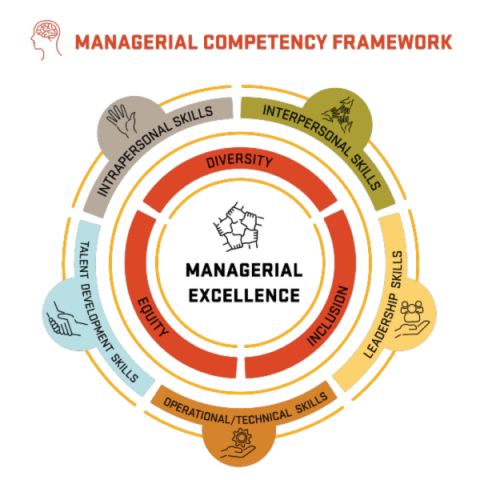
About the Graphic
“Managerial Excellence” anchors the center of the framework and provides a descriptive, aspirational, overarching focal point encompassing specific competency areas.
“Diversity, Equity & Inclusion” (DEI) surrounds Managerial Excellence, signaling the importance and relevance of DEI to all competencies. Applying a diversity, equity, and inclusion lens is critical to demonstrating the skills outlined within each of the five competencies. Competencies supporting this work are aligned with the knowledge, skills, and dispositional effects integrated into the Guidance for Diversity, Equity and Inclusion Learning framework developed by the OSU Office of Institutional Diversity.
Five competencies emanate out from the center, each representing a broad set of knowledge, skills, and abilities important to a holistic picture of an effective manager.
Competencies allow for institutional standards and expectations. These are the knowledge, skills, and abilities that OSU managers must develop and refine to effectively manage and lead units. The absence of a skillset symbolizes a significant short fall in that competency area that could put the unit at risk.
The Competencies
Click on any of the competencies below to learn more!

The internal, trait-enhancing abilities and behaviors that help sustain self- awareness, e.g. knowing one’s skills and strengths, practicing critical thought, managing emotions, coping with challenges, and continuous learning.
- Motivation – Manages and initiates personal action toward organizational and/or unit goals.
- Learning – Continually develops relevant skills and commits to continuous improvement.
- Self-awareness – Knows and effectively leverages strengths and manages weaknesses. Demonstrates understanding of one’s own identities and social group experiences, recognizes the influences on one’s point of view, and critically examines limitations and biases.
- Conscientiousness – Recognizes one’s own impact on others’ work; takes responsibility for own behavior and actions.

The abilities and behaviors to effectively collaborate and communicate across differences.
- Inclusion & responsiveness – Invites, evaluates and applies diverse perspectives to complex issues and to decision making.
- Builds psychological safety – Fosters an environment where speaking up with concerns, sharing ideas, takings risks, or identifying mistakes are encouraged.
- Interpersonal and informational fairness – Provides timely, relevant, and respectful feedback; treats others with dignity.
- Conflict management – Respectfully addresses and resolves issues and problems that arise. Effectively recognizes, uses, and manages the appropriate display of emotions.

Organizational and strategic skills, combined with the talent-centered skills to run one’s unit effectively, efficiently, and ethically within the context of shared governance.
- Vision – Develops a shared vision for future states.
- Management by objectives – Promotes integration of mission and vision with organizational norms, policies, practices, and reward systems.
- Strategy – Creates strategic goals and partnerships to meet organizational values and objectives.
- Change management – Manages organizational change and transition periods; demonstrates adaptability and flexibility.
- Culture – Negotiates and drives organizational culture and values.
- Incentives and motivation – Makes equitable decisions based on procedurally-just principles (i.e., representativeness of interests, bias suppression, accurate information, correctability, and consistency).
- Ethical leadership – Displays ethical decision-making processes and behaviors; consistently manages employees to encourage and reward ethical behavior and decision making.

The skills necessary to run the operational needs of the unit while critically examining business norms that sustain/promote racism
- Systems thinking – Views operations systemically for holistic impact; coordinates efforts.
- Translation – Accurately interprets policy, operationalizes into clear and compliant processes and procedures utilizing technology for efficiencies.
- Stewardship – Proactively manages resources (financial, human, data, etc.) to meet organizational goals.
- Proactivity – Models continuous improvement of processes and creates a culture of excellence.
- Results Driven – Sets and manages priorities and projects to meet goals and targets.
- Measurement – Uses quantitative and qualitative data to evaluate organizational performance.
- Risk Management – Identify, assess, and respond to risks and opportunities, ensuring decisions are aligned with the University’s values; balance strategic, reputational, financial, compliance, operational and life safety obligations.

Building the knowledge, skills, and abilities of others and helping them develop and achieve their potential so that they and the organization can succeed and grow.
- Mentorship – Coaches and mentors employees with individualized consideration for their talents, needs, backgrounds, and interests.
- Network facilitation – Engages, creates, and facilitates supportive and developmental organizational networks for direct reports, both inside and outside of the organization.
- Career learning – Encourages and develops cross-functional expertise and domain knowledge; facilitates professional development and personal growth.
- Promotes inclusive excellence – Creates opportunities for employees to develop skills for maintaining diversity, equity, and inclusion.
- Timely performance feedback – Effectively manages performance feedback systems and processes for all employees with timeliness and transparency.
- Recruitment and retention – Equitably attracts and retains talent.
- Orientation and socialization – Supports the successful on-boarding of employees.